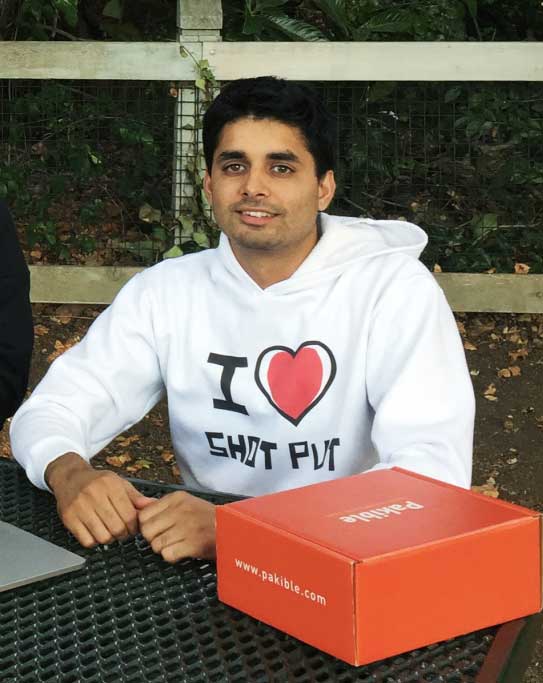Khoury News
CCIS Student Marks Journey from Co-op Employee to Employer
“I’m unemployable,” says CCIS grad Praful Mathur. “I learned that at Northeastern when I was doing my co-ops. I just cannot maintain a steady job. I’m forced into entrepreneurship.” Entrepreneurship […]

“I’m unemployable,” says CCIS grad Praful Mathur. “I learned that at Northeastern when I was doing my co-ops. I just cannot maintain a steady job. I’m forced into entrepreneurship.”
Entrepreneurship has proved to be a lucrative fate for Praful, class of 2011, who is currently working on his second company. While at Northeastern, Praful built and sold his first company, Amp Idea. His third co-op was at Northeastern, helping set up IDEA (Inter-disciplinary Entrepreneurship Accelerator) and the Husky Startup Challenge.
After graduation, Praful worked for Second Market as a software engineer, before being laid off and taking on work as an independent consultant to startups for about eight months. That led him back into entrepreneurship. Praful is now CEO of Shotput, a California-based product fulfillment company seeking to automate – and thus revolutionize – supply chain management systems.
“We’re doing something really new and ambitious,” Praful says. “If you have a physical product and you want it distributed to your customers, we manage the supply chain for you.”
After his first co-op at Exa, Praful learned quickly that working for others just wasn’t for him. He decided to use his co-op experience – and the money he’d saved from co-op – to build his own business. Amp Idea, which developed the hardware used by advertising screens and credit card machines deployed in cabs around Boston, was born. That grew successful enough for Praful to choose a self-employed co-op in 2009. During that period, Praful landed Amp Idea a spot in TechStars, a startup accelerator and development program. In 2010, Praful sold Amp Idea.
At that point, Praful decided he wouldn’t launch any more companies. “It’s way too emotionally draining,” he says. “I didn’t want to do it again. And then I ended up starting another company.”
The idea that brought Praful back to entrepreneurship was one that seeks to simplify global supply chains by bringing in robotics to automate the process. “When you order something from Amazon and it comes in an Amazon box, it’s packaged with Amazon tape and has an Amazon label, it has your product in it, you open it up and you’re like, ‘This is awesome, I got what I needed and I got it in the time I wanted to,’” he says. “Everything that goes into getting that box to your door is a struggle.”
This is where Shotput comes in, using robotics to package the products and prepare them for being mailed out. This will ideally make the process faster, cheaper, more accurate and more consistent: “this will actually affect what the global supply chain looks like in the next 10 years or so,” he says.
Self-employment comes with challenges and rewards, a lesson that Praful has learned over the years. “When you work for yourself, the thing that people don’t immediately recognize is that you take on a lot of emotional burden, and you take on a lot of things that you didn’t consider before,” he says. “You start having to look at the tough decisions and how to make those decisions.”
He was faced with some of these difficult choices recently, when fundraising for Shotput. The company, launched in 2012, offers clients a fully automated system for product distribution. Praful got Shotput into Y Combinator, a California-based incubator that provides seed funding for startups and helps them navigate through wooing investors and fundraising. It was during the fundraising stage of Y Combinator’s program that he was faced with a dilemma, when investors with deep pockets offered term sheets “that didn’t make a lot of sense,” according to Praful. “It’s very hard to say no when you’re looking at that kind of money,” he says. But after just five days of fundraising and tedious decision-making, Shotput reached its goal.
Self-employment has its perks as well: Praful says he enjoys the freedom, the intensity of the workplace, and the ability to pick projects based on interest and coworkers based on talent and mutual respect. “It’s an incredibly empowering and incredibly powerful experience,” he says.
Now, Praful is preparing to make the jump from co-op employee to employer, and bring Northeastern students on-board at Shotput. The first co-op batch will enter in July 2016, he hopes.
After all, Praful says, his success so far is all based on the skills and experiences he gained through his three co-ops. “The fact that I was able to do co-op for myself – I wouldn’t have had a company if it wasn’t for co-op. And if I didn’t have my first company, I wouldn’t have gotten into TechStars and I wouldn’t have the network I have now and I wouldn’t have been able to get through Y Combinator. Everything started from there.”